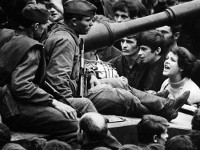Prague Spring: Blunders and miscalculations of the USSR
August 21 marked 45 years since the deployment of Soviet troops in Czechoslovakia that put an end to attempts to reform socialism in the country. The debate about the events of 1968 is going on. The Czechs and the West tend to demonize the Soviet Union in this regard, although it was not the USSR that first expressed the idea to suppress the Prague Spring. By doing so, the Soviet leadership was defending its interests. However, the Soviet Union committed some serious mistakes as well.

The climax in the form of Soviet and other foreign tanks in the streets of Prague, Bratislava and other cities in Czechoslovakia occurred because of attempts to reform socialism. The event went down in history as the "Prague Spring." By the end of the 1960s, planned economy had proved itself a failure. The country that used to be among top ten most developed countries in the world, was lagging behind the West. The growing gap was especially striking against the neighboring capitalist Austria, with which the Czechs had been living in one single country for three centuries.
Economic difficulties were further exacerbated by political troubles. On the eve of the Second World War, Czechoslovakia was the only democratic state in Central Europe. Traditions of parliamentarianism, multi-party system and civil liberties had strong roots in the minds of Czechs (to a lesser extent - of Slovaks). The state of affairs, when the Communist Party was deciding everything and four other parties was playing the role of its puppets was getting more and more unacceptable.
To crown it all, the policies of the Czechoslovak leadership were often determined by the Soviet Union. For the Soviet Union, such a state of affairs was natural: the USSR, just like the USA, had its spheres of influence. But in the eyes of all the Czechs, it all looked different. They were freed from the power of Austria only 50 years before 1968, and only 23 years before that - from the Nazi occupation. They then saw that their masters in Vienna and Berlin had changed to chiefs in Moscow.
Anti-socialist sentiments were fueled from the outside in every way. Thus, Czech and Slovak service of Radio Liberty were broadcasting from Munich. In many areas of Czechoslovakia, people could watch Austrian television, which also had anti-socialist tones. However, the external factor was secondary in relation to the internal one. Most of Czechs and Slovaks were ready for changes and strongly welcomed them.
Such sentiments were present in the leadership of the country too. At first, the actions of the authorities were directed at reforming socialism, the growth of the role of workers and employees in managing their businesses and organizations. Afterwards, it gradually came to deeper political changes. The political struggle in the country ended up with the victory of a group of reformers led by Alexander Dubcek, who pushed the pro-Soviet group in the background.
Having risen to power in January 1968, Dubcek and his companions began to reform the nation's economy and ideology. Censorship gradually eased; the press would often publish critical articles about the Communist Party. Openly anti-communist organizations would appear too. A number of intellectuals began to speak openly about the need to overthrow socialism. Ardent dissidents, including would-be president, then young playwright, Vaclav Havel, became most noticeable.
Such a state of affairs raised concerns with leaderships of other socialist countries. Memories of the events from 1953 in East Germany, from 1956 in Hungary and Poland were still fresh in their memory, when socialism in those states came under threat. Situations in those countries differed little from that in Czechoslovakia - social unrest was manifested there too. Knowing this, the leaders of the German Democratic Republic and Poland, Walter Ulbricht and Wladyslaw Gomulka, called for strict measures against Czechoslovak reformers.
Afterwards, head of Bulgaria Todor Zhivkov called for a hard course against Czechoslovakia. Only the leader of Hungary, Janos Kadar, who also started fairly liberal reforms, advocated a peaceful resolution of the conflict. He gave up his point of view when everyone else was inclined to a military scenario. The leaders of Romania and Yugoslavia, Nicolae Ceausescu, and Josip Broz Tito, were originally against the intervention, but they would stand apart in the socialist camp, and the Soviet Union did not take them into account.
As for the Soviet Union, the country was taking efforts for a few months to avoid a military scenario. Leonid Brezhnev and other leaders of the country negotiated with Dubcek and his team, seeking to persuade them to shelve the reforms. In order to put pressure on Czechoslovakia, military exercises Šumava were conducted in the country in June 1968: 16,000 Soviet soldiers and officers were staying on its territory. However, they did not visit any settlements.
However, the negotiations continued through the middle of August 1968. Mindful of the bloody events in Hungary in 1956, and of traditionally friendly relations with Czechoslovakia, the Soviet Union was trying to delay the moment of execution. However, Dubcek and his team were in no hurry to curtail the reforms. On August 20 overnight, Soviet, Polish, East German, Hungarian and Bulgarian troops entered Czechoslovakia.
Today, the Czechs and Slovaks do not like to recollect the fact that there were people in the leadership of the country who called the Soviet tanks. This is exactly what happened, though. Foreign military vehicles appeared on the streets of Czech and Slovak cities after a group of five members of the leadership of the Communist Party signed a letter calling to deploy tanks of brotherly countries in the country. Some of the Czechs and Slovaks were saying years later that the move to deploy tanks in Czechoslovakia was a correct one, because there was a threat of civil war in the country. However, those were in a distinct minority.
The Czechs and Slovaks took to the streets to protest against the foreign invasion. As a result, 72 citizens of Czechoslovakia and 13 Soviet soldiers and officers were killed. But all was in vain. The "Prague Spring" was suppressed. Its leaders were removed from the administration of the country, sympathizers were fired from their jobs, and active dissident Westerners were sent to prisons or deported to the West. Pro-Soviet Gustav Husak came to power, and the country was left in the camp of socialism for 21 more years. He was swept away only as a result of the "Velvet Revolution" in 1989.
Was the Soviet Union right? From the point of view of preservation of socialism - it was. From the point of view of international law - Czechoslovakia was a member of the Warsaw Pact with relevant obligations and a right to seek armed assistance - the USSR could act so too. The United States was busy with the war in Vietnam, staging coups in Latin America and toppling unwanted presidents contrary to all legal norms. The Soviet leadership proceeded from the fact that indulging to Czechoslovak reforms would entail a turn to capitalism throughout Central Europe.
It meant that the Soviet Union would lose its influence in the region, so it could not be weak at this point. After all, hardly had the grip of the USSR weakened, when socialism in the countries of Central Europe collapsed instantly. The Soviet Union lost its influence in the region, and successors to Czechoslovakia were pulled into the European Union and NATO. Today, both the Czech Republic and Slovakia build their policies on the basis of their membership in these organizations.
At the same time, Soviet leaders did not show flexibility. They did not engage in a dialogue with leaders of the "Prague Spring" - they only put ultimatums to them. A dialogue with anti-communist dissidents was out of the question. However, not everyone was full of hatred against the Soviet Union. There were sane people among them. As a result of military actions, many of them could no longer accept anything Russian and Soviet. Not all people were willing to see their country as a NATO member, but they eventually said yes to its.
A radical wing with Vaclav Havel at the head prevailed among the dissenters. Once in power, his representatives promptly turned the Czech Republic to the West and dragged the country into NATO. They denied almost all Russian and Soviet. The relations between Russia and the Czech Republic became more than just cool. The same goes to the relations between Russia and Slovakia, although to a lesser extent.
Tanks in the streets of Prague and Bratislava turned many ordinary Czechs and Slovaks against the USSR and the Russians. Before August 1968, one could speak about the Slavic brotherhood. Afterwards, the people started to perceive the Soviet Union as an occupier. From the brotherly nation, which was liberated in 1945, Czechoslovakia turned into a conquered state.
It just so happened that after the suppression of the "Prague Spring," the image of the enemy for the Czechs and Slovaks changed. Previously, it was Germany and Austria, but then, it was the Soviet Union. The "Velvet Revolution" and the subsequent steps to pull away from the Soviet Union and Russia, was, of course, planned in the West, but the external factor played a minor role there. By the end of the 1980s, the Czechs and Slovaks, being fed up with socialism, were craving this turn of events.
Vadim Trukhachev
Pravda.Ru
Subscribe to Pravda.Ru Telegram channel, Facebook, RSS!





